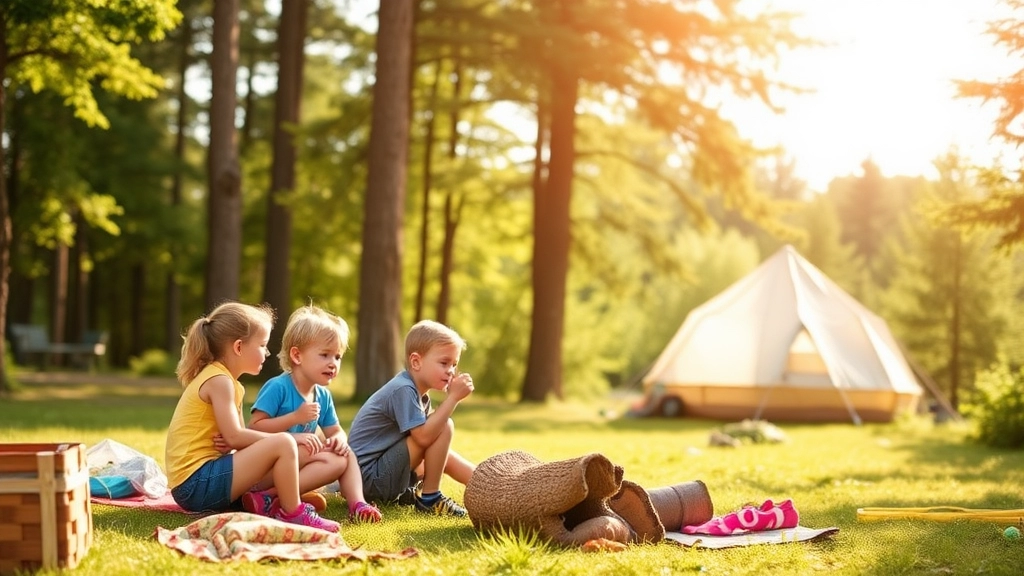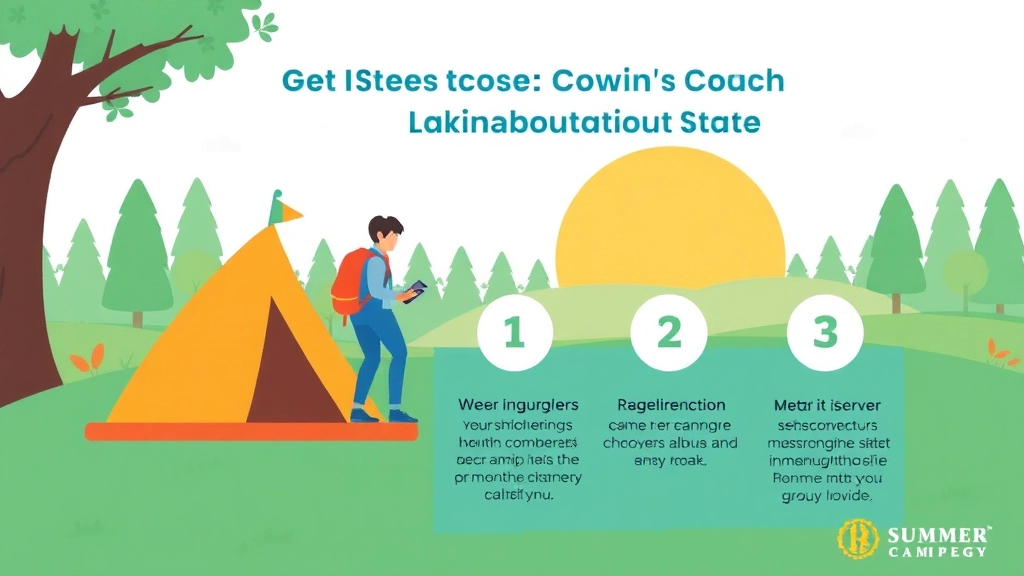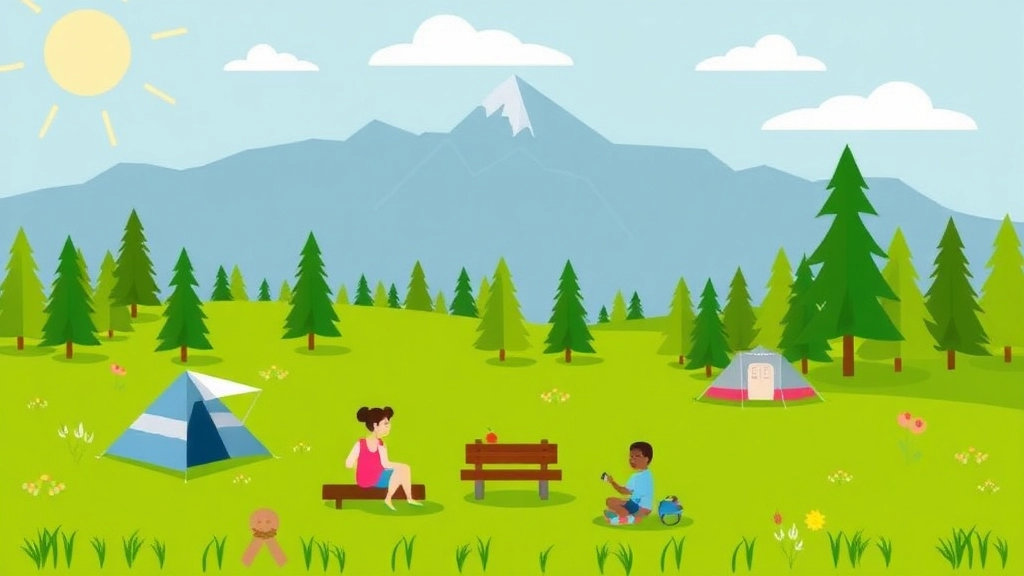Understanding Summer Camp Insurance
Running a summer camp is a rewarding yet challenging endeavor, filled with the joy of creating unforgettable memories for campers. However, it also comes with its fair share of risks. This article delves into the importance of summer camp insurance, covering everything from the types of coverage available to the key benefits of insuring your camp. We’ll also explore common risks and liabilities, how to choose the right insurance provider, and the cost factors involved. Whether you’re a seasoned camp director or new to the field, understanding summer camp insurance is crucial for protecting your camp, staff, and campers.
The Importance of Summer Camp Insurance
Summer camp insurance is more than just a safety net; it’s a vital component that ensures the smooth operation of your camp. From general liability and accident medical insurance to property and workers’ compensation coverage, having the right policies in place can save you from financial ruin and legal troubles.
What to Expect
We’ll guide you through the steps to apply for insurance, highlight the benefits, and answer frequently asked questions to help you make an informed decision. So, let’s dive in and discover how you can secure peace of mind and focus on what truly matters—providing an enriching experience for your campers.
Types of Coverage for Summer Camp Insurance
Alright, let’s talk about the nitty-gritty of summer camp insurance. If you’re running a summer camp, you’ve probably got a million questions swirling around in your head. What happens if a camper gets hurt? What if someone damages the property? How do you protect your staff? These are all valid concerns, and that’s where summer camp insurance steps in.
General Liability Insurance
First up, we’ve got General Liability Insurance. This is your bread and butter. It covers the basics like:
- Bodily Injury: If a camper or visitor gets injured on your campgrounds, this part of the policy steps in to cover medical costs.
- Property Damage: Say a camper accidentally breaks a window or damages another camper’s belongings. This coverage has got you covered.
- Legal Defence: If someone decides to sue your camp, this insurance helps cover legal fees.
Accident Medical Insurance
Next in line is Accident Medical Insurance. Picture this: a camper falls during a hike and needs emergency medical treatment. This coverage ensures that medical expenses are taken care of without draining your camp’s funds.
Camper or Participant Coverage
This one’s all about the kids. Camper or Participant Coverage is specifically designed to protect the campers. It covers:
- Medical Expenses: For injuries sustained during camp activities.
- Accidental Death and Dismemberment: It’s a grim thought, but in the worst-case scenario, this coverage provides financial compensation.
Property Insurance
Running a camp means you’ve got buildings, equipment, and other assets to worry about. Property Insurance covers:
- Buildings and Structures: From cabins to dining halls, if any structure gets damaged, this insurance helps with repairs.
- Equipment: Think canoes, sports gear, or even kitchen appliances. If they’re damaged or stolen, you’re covered.
Workers’ Compensation
Your staff is the backbone of your camp. Workers’ Compensation ensures that if they get injured on the job, their medical expenses and lost wages are covered. This not only protects your staff but also shields your camp from potential lawsuits.
Abuse and Molestation Coverage
This is a tough but necessary topic. Protecting campers from abuse and molestation is paramount. This coverage helps manage the financial and legal repercussions if such unfortunate events occur.
Commercial Auto Insurance
If your camp uses vehicles to transport campers or staff, Commercial Auto Insurance is a must. It covers:
- Liability: For injuries or damages caused by your vehicles.
- Physical Damage: To your vehicles from accidents, theft, or vandalism.
Umbrella Liability Insurance
Think of this as an extra layer of protection. Umbrella Liability Insurance kicks in when your other liability coverages max out. It’s like having a safety net for your safety net.
For more information on organizing a successful camp, check out our Summer Camp Canteen Setup guide. Additionally, ensure your camp’s activities are engaging by exploring our Top Summer Camp Games and Activities Guide.
Key Benefits of Insuring Your Summer Camp

Ever wondered what would happen if an unexpected event threw your summer camp into chaos?
Yeah, me too.
Let’s get real: running a summer camp involves risks. And not just the “Oh no, we ran out of marshmallows” kind of risks.
I’m talking about serious stuff.
Like injuries, property damage, and even lawsuits.
Here’s why insuring your summer camp is a game-changer:
Financial Protection
Imagine a camper breaks an arm during a game. Medical bills can skyrocket. Without insurance, you’re footing that bill out of pocket.
Peace of Mind
Knowing you’re covered means you can focus on what really matters: creating unforgettable experiences for the kids.
Legal Compliance
Many places require camps to have specific types of coverage. Skip this, and you might find yourself in hot water.
Reputation Management
Accidents happen. But how you handle them can make or break your camp’s reputation. Insurance helps you manage crises smoothly.
Employee Protection
Your staff works hard. If they get injured, you need to ensure they’re taken care of. Workers’ compensation insurance covers this.
Flexibility in Activities
Worried about adding that new rock climbing wall? With the right insurance, you can expand your offerings without the constant fear of liability.
Property Coverage
Storms, fires, and thefts don’t send a warning. Property insurance ensures your camp can bounce back quickly.
Real Stories, Real Impact
Let me share a quick story.
A friend of mine runs a summer camp.
One summer, a tree fell on one of their cabins during a storm.
Without insurance, they would’ve been knee-deep in repair costs.
But because they were insured, they got the cabin fixed in no time and didn’t have to cancel any sessions.
That’s the power of insurance.
Quick Recap
- Financial Protection: Covers unexpected costs.
- Peace of Mind: Focus on fun, not fear.
- Legal Compliance: Stay out of legal trouble.
- Reputation Management: Handle crises like a pro.
- Employee Protection: Take care of your team.
- Flexibility in Activities: Expand offerings confidently.
- Property Coverage: Recover from disasters quickly.
Common Risks and Liabilities in Summer Camps
Ever wondered what could go wrong at a summer camp? Trust me, it’s not all marshmallows and campfires. The keyword here is “common risks and liabilities in summer camps,” and it’s a big deal. So, let’s break it down.
Physical Injuries
Kids running around, climbing trees, swimmingâit’s a recipe for accidents. Here’s what you need to watch out for:
- Slips and Falls: Wet surfaces near pools or uneven ground can result in sprains or fractures.
- Sports Injuries: Think twisted ankles, broken bones, or even concussions from contact sports.
- Heat-Related Illnesses: Dehydration, heat exhaustion, and heatstroke are real threats, especially during those scorching summer days.
Health Issues
It’s not just about physical injuries. Health problems can pop up too:
- Food Allergies: One wrong bite and you could be dealing with a severe allergic reaction.
- Illness Outbreaks: Close quarters mean that if one kid catches something, it can spread like wildfire.
Emotional and Psychological Risks
Believe it or not, emotional and psychological risks are just as critical:
- Bullying: It can happen anywhere, even in the great outdoors.
- Homesickness: Some kids struggle being away from home, and it can escalate into more serious emotional issues.
Property Damage
Kids can be rough on stuff. Here’s what you need to think about:
- Vandalism: Whether intentional or accidental, property damage can be costly.
- Natural Disasters: Floods, fires, or storms can wreak havoc on camp facilities.
Legal Liabilities
And then there’s the legal side of things:
- Negligence Claims: If someone gets hurt and it’s deemed the camp’s fault, you could be looking at a hefty lawsuit.
- Employment Issues: Disputes with staff over contracts, wages, or working conditions can also lead to legal troubles.
Real-Life Example
A few years back, a summer camp in the UK faced a lawsuit because a child broke their arm during an unsupervised activity. The camp was found negligent and had to pay a significant sum in damages. This could have been avoided with proper risk management and insurance coverage.
How to Mitigate These Risks
Now, what can you do to mitigate these risks? Here are some bullet points to keep it simple:
- Training: Ensure all staff are trained in first aid and emergency procedures.
- Safety Protocols: Implement and enforce strict safety guidelines.
- Health Screenings: Conduct thorough health checks and keep medical records up-to-date.
- Supervision: Maintain adequate staff-to-camper ratios to ensure constant supervision.
- Insurance: Of course, having comprehensive summer camp insurance is your safety net.
Why It Matters
Understanding these common risks and liabilities in summer camps is crucial. It’s not just about avoiding lawsuits; it’s about creating a safe and enjoyable environment for everyone involved. Trust me, the peace of mind is worth it.
If you’re looking to get more involved, check out our Summer Volunteer Guide for tips on how to contribute effectively. For those planning to send their kids to camp, our Ultimate Packing Guide will ensure they have everything they need for a safe and fun experience.
How to Choose the Right Insurance Provider

Worried about picking the right insurance provider for your summer camp?
You’re not alone.
It’s a big decision, and you want to get it right.
So, how do you choose?
Here’s the lowdown.
1. Do They Understand Summer Camps?
Not all insurance providers are created equal.
Some specialise in summer camps, while others don’t.
You want someone who gets the unique risks and needs of a summer camp.
2. Reputation Matters
Look for reviews and testimonials.
What are other camp owners saying?
A good reputation is a solid indicator of trustworthiness and reliability.
3. Customisable Coverage
One-size-fits-all doesn’t work here.
Your camp is unique, and your insurance should be too.
Look for providers that offer customisable coverage options.
4. Financial Stability
You want to make sure your provider can pay out claims.
Check their financial ratings.
A financially stable provider is less likely to leave you hanging.
5. Customer Service
When something goes wrong, you want help fast.
Test their customer service before you commit.
How quickly do they respond?
Are they helpful?
6. Claims Process
A smooth claims process is crucial.
Ask about it upfront.
How easy is it to file a claim?
What’s the average turnaround time?
7. Cost vs. Coverage
Don’t just go for the cheapest option.
Balance cost with the coverage you’re getting.
Sometimes paying a bit more is worth the peace of mind.
8. Industry Experience
How long have they been in the game?
Experience often equals expertise.
9. Recommendations
Talk to other camp owners.
Who do they use?
Word of mouth can be incredibly valuable.
10. Legal Compliance
Make sure they comply with all local regulations.
You don’t want any legal headaches down the line.
Cost Factors for Summer Camp Insurance
Alright, let’s dive right into it. When you’re running a summer camp, insurance isn’t just a nice-to-haveâit’s a must-have. But what does it cost? Well, that’s the million-dollar question, isn’t it? Here’s the lowdown on what affects the price of summer camp insurance.
What Drives the Cost of Summer Camp Insurance?
Type of Camp
- Day Camps vs. Overnight Camps: Day camps generally cost less to insure because the risks are lower. Overnight camps, on the other hand, have higher premiums due to the 24/7 nature of their operations.
- Specialised Camps: If your camp focuses on high-risk activities like rock climbing or water sports, expect to pay more. These activities come with higher risks, and insurers factor that into the cost.
Number of Campers and Staff
- More People, More Risk: The more campers and staff you have, the higher your insurance costs will be. It’s a simple numbers gameâmore people mean more potential for accidents and claims.
Location
- Remote vs. Urban: Camps in remote areas may face higher premiums due to the difficulty of accessing emergency services. Conversely, camps in urban areas might have higher liability risks, but easier access to medical facilities.
Duration of the Camp
- Short-Term vs. Long-Term: A camp that runs for a few weeks will generally cost less to insure than one that operates all summer long. The longer the duration, the higher the risk, and hence, the higher the cost.
Coverage Options
- Basic vs. Comprehensive: Basic plans cover general liability and property damage. Comprehensive plans include additional coverages like accident insurance, camper injury, and even sexual misconduct liability. The more you add, the more you pay.
Breaking It Down: Real-Life Examples
Let’s say you run a day camp in a suburban area with 100 campers and 20 staff. If you go for basic coverage, you might be looking at around £1,000 to £2,000 for the season. Now, if you run an overnight camp in a remote location with high-risk activities and opt for comprehensive coverage, your costs could easily soar to £10,000 or more.
Hidden Costs to Watch Out For
- Deductibles: Lower premiums often come with higher deductibles. Make sure you can afford the out-of-pocket costs if you ever need to file a claim.
- Exclusions: Some policies exclude certain activities or risks. Always read the fine print to avoid nasty surprises.
How to Save on Summer Camp Insurance
- Shop Around: Don’t settle for the first quote you get. Compare multiple providers to find the best deal.
- Bundle Policies: Some insurers offer discounts if you bundle multiple types of coverage, like general liability and property insurance.
- Risk Management: Implement safety protocols and training programs. Some insurers offer lower premiums to camps with robust risk management practices.
Real Questions Camp Directors Ask
- “How much will it cost to insure my camp?”
- “What factors affect my premium?”
- “Are there ways to lower my insurance costs?”
These are the questions I get asked all the time, and now you have the answers. Remember, insurance is an investment in your camp’s future. It’s not just about covering your bases; it’s about ensuring peace of mind for you, your staff, and the parents who trust you with their kids.
For more tips on managing camp costs, check out our guide on how much is summer camp. Additionally, learn about grants for summer camps to help manage your expenses.
Steps to Apply for Summer Camp Insurance

Worried about getting the right insurance for your summer camp?
You’re not alone.
Let’s break it down step-by-step so you can get the coverage you need without losing your mind.
1. Assess Your Needs
First things first.
What kind of coverage do you actually need?
Think about:
- Property damage: Do you own the campgrounds or rent them?
- Liability: What activities will campers be doing? Anything risky?
- Medical coverage: How will you handle injuries or illnesses?
2. Research Providers
Not all insurance providers are created equal.
Look for companies that specialise in summer camp insurance.
Check their reviews.
Ask other camp owners for recommendations.
3. Get Quotes
Now, it’s time to get some quotes.
Reach out to multiple providers.
Make sure you’re comparing apples to apples.
Look at:
- Premiums
- Deductibles
- Coverage limits
4. Review the Policies
Got your quotes?
Great.
Now, dig into the details.
Look for any exclusions or limitations that could bite you later.
5. Ask Questions
Don’t be shy.
If something doesn’t make sense, ask.
Insurance jargon can be confusing, but a good provider will explain everything in plain English.
6. Finalise the Policy
Once you’re happy with a policy, it’s time to finalise it.
Make sure all your details are correct.
Sign the dotted line.
7. Keep Your Policy Updated
Things change.
Make sure your insurance policy changes with them.
Update your coverage if you add new activities or facilities.
Applying for summer camp insurance doesn’t have to be a headache.
Follow these steps, and you’ll be well on your way to getting the protection you need.
Frequently Asked Questions About Camp Insurance
Alright, let’s dive into the nitty-gritty of camp insurance.
Ever wonder, “Do I really need insurance for my summer camp?”
You’re not alone.
Here’s the deal:
What Exactly Does Camp Insurance Cover?
Camp insurance is like a safety net.
It covers property damage, injuries, and even natural disasters.
Think of it as peace of mind when kids are running around.
Why Is Camp Insurance Important?
Imagine a camper breaks an arm or a storm damages your cabins.
Without insurance, you’re footing the bill.
Insurance keeps your camp afloat when life throws curveballs.
How Much Does Camp Insurance Cost?
Costs vary.
Factors include:
- Camp size
- Activities offered
- Location
Get a quote to see what you’re dealing with.
Can I Choose Specific Coverage?
Absolutely.
You can customise coverage:
- Accident insurance for injuries
- Liability insurance for lawsuits
- Property insurance for damages
Tailor it to fit your camp’s needs.
How Do I Pick the Right Provider?
Look for:
- Experience in camp insurance
- Positive reviews
- Flexible plans
Ask around, read reviews, and get recommendations.
What Happens If I Don’t Have Insurance?
In short, big risks.
You could face financial ruin if something goes wrong.
Insurance isn’t just a box to tick; it’s essential.
Any Tips for Getting Started?
- List your camp’s needs
- Research providers
- Get multiple quotes
And remember, camp insurance isn’t just a formalityâit’s your camp’s lifeline.
Got more questions?
Fire away!
For more insights, check out our Ultimate Packing Checklist and learn about the activities that make camps fun and educational.
FAQs on Summer Camp Insurance
What are the key benefits of insuring my summer camp?
Insuring your summer camp provides several benefits, including financial protection, peace of mind, and legal compliance. It also helps with reputation management, employee protection, and allows for flexibility in activities and property coverage.
How does summer camp insurance offer financial protection?
Insurance covers unexpected costs such as medical bills from injuries or property damage, ensuring that you don’t have to pay out-of-pocket for significant expenses.
Why is peace of mind important for camp operators?
Knowing that you’re covered by insurance allows you to focus on creating memorable experiences for the campers without constantly worrying about potential risks and liabilities.
What types of coverage should a summer camp have to meet legal requirements?
Many places require camps to have specific types of insurance coverage, such as liability insurance and workers’ compensation. Ensuring you have the right coverage helps you stay compliant with local regulations.
How can insurance help with reputation management?
Accidents happen, but how you handle them can significantly impact your camp’s reputation. Insurance helps you manage crises smoothly, maintaining trust and credibility with parents and campers.
What should I look for in an insurance provider for my summer camp?
Consider factors like their understanding of summer camps, reputation, customisable coverage options, financial stability, customer service, claims process, cost vs. coverage, industry experience, recommendations, and legal compliance.
How can I assess my summer camp’s insurance needs?
Identify what kind of coverage you need by considering factors like property damage, liability for activities, and medical coverage for injuries or illnesses.
What steps should I take to apply for summer camp insurance?
Follow these steps: assess your needs, research providers, get quotes, review the policies, ask questions, finalise the policy, and keep your policy updated as your camp evolves.
Why is it important to keep my insurance policy updated?
As your camp adds new activities or facilities, your insurance needs may change. Keeping your policy updated ensures that you remain adequately protected against new risks.
References
-
Insurance Coverage 101 for Camp Directors
-
Understanding Insurance for Summer Camps
-
Why Insurance is Important for Summer Camps

